

Author of "Freefall: Leadership Lessons from the Skies", "Leadership Unpacked" & "Punchlines & Power Moves", International speaker, MC & experienced leadership development & contact centre and collections consultant. Thinkers 360 Top 50 Thought Leader. Improving people, processes, payments & performance
Available For: Advising, Authoring, Consulting, Influencing, Speaking
Travels From: Dublin
Speaking Topics: Leadership, Contact Centres, MC
| Dara Kiernan | Points |
|---|---|
| Academic | 0 |
| Author | 150 |
| Influencer | 19 |
| Speaker | 18 |
| Entrepreneur | 0 |
| Total | 187 |
Points based upon Thinkers360 patent-pending algorithm.
 Leadership Under Pressure: The Tantrum at 30,000 Feet: Leading with Awareness
Leadership Under Pressure: The Tantrum at 30,000 Feet: Leading with Awareness
Tags: Customer Experience, Leadership, Management
 What Rory (and Shane) taught us at The Masters 2025
What Rory (and Shane) taught us at The Masters 2025
Tags: Customer Experience, Leadership, Management
 The Language of Leadership (And Why You Need a Translator Hat)
The Language of Leadership (And Why You Need a Translator Hat)
Tags: Customer Experience, Leadership, Management
 Can you teach AI how to have the 'craic'?
Can you teach AI how to have the 'craic'?
Tags: Customer Experience, Leadership, Management
 Mastering Self-Awareness: Key Lessons & Tips for Leaders from the World of Comedy
Mastering Self-Awareness: Key Lessons & Tips for Leaders from the World of Comedy
Tags: Customer Experience, Leadership, Management
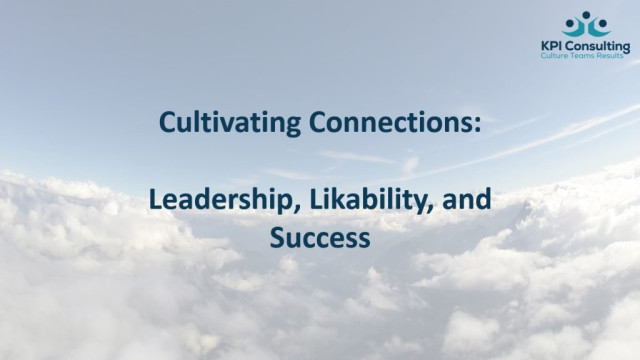 --Cultivating Connections: Leadership, Likability, and Success
--Cultivating Connections: Leadership, Likability, and Success
Tags: Customer Experience, Leadership, Management
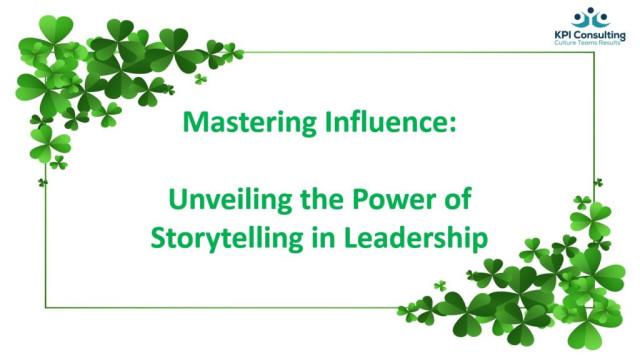 Mastering Influence: Unveiling the Power of Storytelling in Leadership
Mastering Influence: Unveiling the Power of Storytelling in Leadership
Tags: Customer Experience, Leadership, Management
 5 Leadership Tips for 2024 – Part 4 – Embracing Change
5 Leadership Tips for 2024 – Part 4 – Embracing Change
Tags: Leadership, Management
 Embracing the Inevitable: The Importance of Planning for Failure in Leadership
Embracing the Inevitable: The Importance of Planning for Failure in Leadership
Tags: Leadership, Management
 Chapter 23: Breaking Orbit
Chapter 23: Breaking Orbit
Tags: Coaching, Leadership, Management
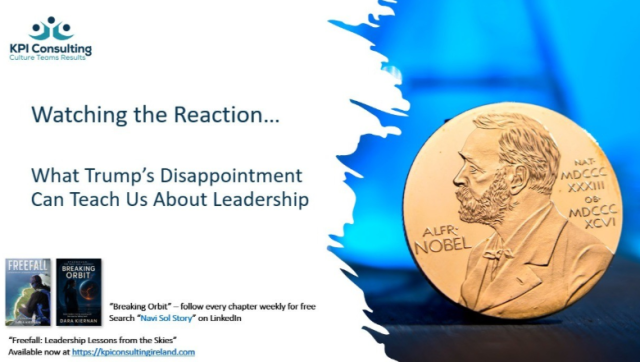 Watching the Reaction - What Trump’s Disappointment Can Teach Us About Leadership
Watching the Reaction - What Trump’s Disappointment Can Teach Us About Leadership
Tags: Coaching, Leadership, Management
 Ryder Cup Lessons: Resilience in the Face of Noise
Ryder Cup Lessons: Resilience in the Face of Noise
Tags: Coaching, Leadership, Management
 Chapter 17: Conversations That Matter
Chapter 17: Conversations That Matter
Tags: Coaching, Leadership, Management
 Proactive Quantum-AI Governance: Ensuring Trust and Resilience
Proactive Quantum-AI Governance: Ensuring Trust and Resilience
Tags: Coaching, Leadership, Management
 Chapter 11: Tela, Rix and The New One
Chapter 11: Tela, Rix and The New One
Tags: Coaching, Leadership, Management
 Chapter 10: The Metrics Mirage
Chapter 10: The Metrics Mirage
Tags: Customer Experience, Leadership, Management
 Culture & Leadership: A “Sobering” Wake-Up for Roads Policing
Culture & Leadership: A “Sobering” Wake-Up for Roads Policing
Tags: Coaching, Leadership, Management
 Chapter 9: The Almost Thing
Chapter 9: The Almost Thing
Tags: Coaching, Leadership, Management
 Chapter 6, Episode 2: The Brief Escape
Chapter 6, Episode 2: The Brief Escape
Tags: Coaching, Leadership, Management
 Chapter 4 - Episode 1 - Quiet Gravity
Chapter 4 - Episode 1 - Quiet Gravity
Tags: Coaching, Leadership, Management
 Chapter 3, Part 2 – Meetings, Metrics & Mayhem
Chapter 3, Part 2 – Meetings, Metrics & Mayhem
Tags: Coaching, Leadership, Management
 Chapter 2 – The Name Tag Isn’t the Role
Chapter 2 – The Name Tag Isn’t the Role
Tags: Coaching, Leadership, Management
 Chapter 1 – The First Real Briefing
Chapter 1 – The First Real Briefing
Tags: Coaching, Leadership, Management
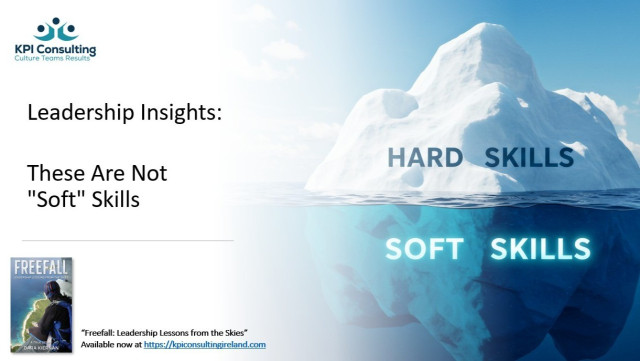 Leadership Insights: These Are Not "Soft" Skills
Leadership Insights: These Are Not "Soft" Skills
Tags: Coaching, Leadership, Management
 Welcome Aboard - The Journey Begins Shortly
Welcome Aboard - The Journey Begins Shortly
Tags: Coaching, Leadership, Management
 New Storytelling Series: Leadership Lessons in a Sci-Fi Future
New Storytelling Series: Leadership Lessons in a Sci-Fi Future
Tags: Coaching, Leadership, Management
 VE Day at 80: Leadership Lessons from the End of a War—and the Start of a Wiser World
VE Day at 80: Leadership Lessons from the End of a War—and the Start of a Wiser World
Tags: Coaching, Leadership, Management
 Leadership at Augusta: What Rory (and Shane) taught us on Sunday
Leadership at Augusta: What Rory (and Shane) taught us on Sunday
Tags: Coaching, Leadership, Management
 Womb With a View: Leadership Lessons from Two Unborn Philosophers
Womb With a View: Leadership Lessons from Two Unborn Philosophers
Tags: Coaching, Leadership, Management
 The Suit, The Hoodie, and The Leadership Illusion
The Suit, The Hoodie, and The Leadership Illusion
Tags: Coaching, Leadership, Management
 Leadership Insights: AI in Irish Contact Centres – Overcoming Hesitancy and Finding the Right Fit
Leadership Insights: AI in Irish Contact Centres – Overcoming Hesitancy and Finding the Right Fit
Tags: Coaching, Leadership, Management
 Hogwarts for Executives: Leadership Lessons from Harry Potter (Without Needing a Wand)
Hogwarts for Executives: Leadership Lessons from Harry Potter (Without Needing a Wand)
Tags: Coaching, Leadership, Management
 Timing, Pints, and the Art of Selling the Vision
Timing, Pints, and the Art of Selling the Vision
Tags: Coaching, Leadership, Management
 What AI Can Teach Us About Feedback To Fuel Our Own Growth
What AI Can Teach Us About Feedback To Fuel Our Own Growth
Tags: Coaching, Leadership, Management
 Freefall: Leadership Lessons from the Skies
Freefall: Leadership Lessons from the Skies
Tags: Coaching, Leadership, Management
 Leadership Unpacked
Leadership Unpacked
Tags: Coaching, Leadership, Management

Tags: Coaching, Leadership, Management
 Leadership Tips for SMEs
Leadership Tips for SMEs
Tags: Business Strategy, Leadership, Management
 The Leadership Lunch
The Leadership Lunch
Tags: Coaching, Leadership, Management

Tags: Business Strategy, Leadership, Management
 Sponsor Webinar - IRIS Clarity - Digital CX – An Innovation Solution to Enhance your Voice Contacts
Sponsor Webinar - IRIS Clarity - Digital CX – An Innovation Solution to Enhance your Voice Contacts
Tags: Leadership, Management, Innovation

Tags: Customer Experience, Leadership, Management
 When the Hecklers Take Over: Leadership Lessons from the Comedy Stage
When the Hecklers Take Over: Leadership Lessons from the Comedy Stage
I recently spoke about the surprising similarities between leadership and stand-up comedy, and one point really resonated: in both roles, your primary job is to facilitate the expectations of your audience.
In comedy, most people come to a show to laugh. The comedian’s job is simple in concept but challenging in execution: create an environment where laughter thrives.
In leadership, most people come to work with the intent to do good work, contribute meaningfully, and be appreciated. A leader’s job is similarly straightforward at its core: facilitate an environment where hard work and appreciation flourish.
But here’s the twist: in both scenarios, there’s always a minority who challenge the flow. Some people attend comedy shows to heckle, and some come to work to be disruptive. This is an unchangeable reality. The key to success lies not in wishing these individuals away but in recognising, respecting, and managing them appropriately.
What happens when these disruptors go unchecked? Let’s revisit the comedy analogy I shared:
Imagine a comedian who lets hecklers dominate the show. At first, the majority of the audience grows uncomfortable. They didn’t pay good money to hear a heckler - they came for the comedian.
Over time, fewer and fewer of the “good laughers” come back. They find other shows that protect the audience experience.
Meanwhile, unchecked hecklers multiply. Eventually, the comedian is left on stage in a room full of hecklers, and the very act of performing becomes miserable.
Now imagine this in a workplace. If leaders avoid addressing disruptions, the productive, motivated employees - the equivalent of the “good laughers” - will start looking elsewhere. Over time, the environment deteriorates, and the disruptors take over.
As a leader, don’t let this happen to you or your team. While it may feel uncomfortable to address disruptive behaviour, it’s your responsibility to protect the environment you’ve worked hard to cultivate. By managing the “hecklers” effectively, you ensure that the majority - your true audience - continues to feel supported, engaged, and appreciated.
Try setting this as a personal goal for yourself in 2025: be the kind of leader who always protects and facilitates a positive environment for your team. It’s not always easy, but it’s worth it - for the good of the audience and the leader alike.
Wishing you all a Merry Christmas and a fantastic New Year ahead! Let’s make 2025 the year we lead with clarity, courage, and care.
Tags: Coaching, Leadership, Management
 Practice makes Perfect vs Practice makes Permanent
Practice makes Perfect vs Practice makes Permanent
When writing a book you get the opportunity to speak to some amazing people who at times can enlighten you and make you look at things a little differently. This post is about a common phrase we all use and when speaking to someone about this, especially in the world of skydiving, his view of the phrase is a little different. Because in his world, life and death is a real thing.
So, for this post, we'll look at the difference between 'Practice makes Perfect' and 'Practice makes Permanent', and we'll use an analogy we are all familiar with.
We often hear the phrase "Practice makes perfect," but in leadership and skydiving, there's a more profound truth: "Practice makes permanent."
Consider the journey of learning to drive. During our driving lessons, we meticulously practice every turn and every mirror check because we want to pass the test. We're focused, deliberate, and intentional, knowing that our actions have significant consequences.
However, human behaviour often leads us to focus solely on passing the driving test - treating it as the ultimate goal. We pour all our energy into mastering the skills needed to pass, but once that test is behind us, the focus often wanes. Despite the fact that driving can be a matter of life and death, we allow poor behaviours to creep in over time.
Over time, these bad habits, repeated often, become our new "normal." This is where the concept of "Practice makes permanent" truly hits home, and this is when we truly place ourselves at risk.
In leadership, the habits we cultivate daily - whether intentional or not - become embedded in our leadership style. If we practice poor communication, lack of empathy, or inconsistent decision-making, these behaviours become our default, impacting our teams and organisations in lasting ways. Conversely, if we lead with intentionality, clarity, and consistency, these positive practices become the cornerstone of our leadership.
Are you the same person who passed the 'leadership' test? If not, identify what distracts your focus from the wheel and practice safe leadership.
Just as in driving, where consistent, mindful practice leads to safe and skilled driving, in leadership, it's about practicing the right behaviours consistently.
Great leaders don't just aim for perfection; they aim to make the right practices permanent, creating a culture of excellence and integrity that stands the test of time.
So, whether you're behind the wheel or leading a team, remember: Practice doesn't always make perfect - it makes permanent. What leadership practices are you making permanent today?
Tags: Coaching, Leadership, Management
 Celebrating Birthdays: A Simple Way to Make Your Team Feel Special
Celebrating Birthdays: A Simple Way to Make Your Team Feel Special
In leadership, it's often the little things that make the biggest difference. Like remembering your team members' birthdays each year.
Sure, it's not a groundbreaking strategy, but the smiles, surprise, and appreciation you get in return are priceless. Plus, nothing beats the fun of pretending to have a "telepathic connection" to recall everyone's special day!
I recently met a great guy who worked in one of my teams a few years ago and he asked me how I managed to remember everyone's birthdays each year. And the answer is simple - every time someone joined the team, I added their date of birth as a recurring annual reminder in my outlook calendar and that was it. Simple, right?
And it's funny the impact that this small gesture had. Initially when I started doing this, I just thought it'd be a nice thing to do to just send an email directly from myself to the birthday boy or girl, with a simple 'Happy Birthday' in the Subject line, and a 'Hope you have a lovely day' in the email message. I would never publicise the occasion, and it was always kept between me and the recipient.
People loved the gesture, and years later when I met this guy, he said it was something that everyone would talk about every time someone had a birthday, and he never experienced it anywhere else. In fact, he told me, every time the other team members knew it was a colleagues birthday, they would always cheerily ask, 'Did you get your birthday email from himself?'.
I have to say, I was so delighted to hear that feedback - I never realised the impact that it had on others.
True employee experience is how you make people feel, and it's the simple things in life that make people feel great.
If you're not already doing this, start now and see for yourself. Don't ask HR to do it for you, but surely I don't need to tell you that, do I?
So, here's to the power of small gestures in building a strong, happy team. Remember, leadership isn't always about the grand gestures; sometimes, it's as simple as saying, "Happy Birthday!"
Tags: Coaching, Leadership, Management
 Leadership Lessons from Taylor Swift: Inspiring Success in Dublin and Beyond
Leadership Lessons from Taylor Swift: Inspiring Success in Dublin and Beyond
As Taylor Swift gears up to captivate audiences with three electrifying shows at Dublin's Aviva Stadium this weekend, we can all draw valuable leadership lessons from her remarkable journey and dynamic presence. And hey, let’s throw in a bit of fun with some of her iconic song titles - and fair warning, it'll be cheesy !
Visionary Thinking: Taylor Swift's ability to constantly reinvent her music and image showcases a forward-thinking mindset. Leaders should embrace innovation and anticipate future trends to stay ahead.
Remember, you don’t want to be caught saying, "I Knew You Were Trouble" because you didn’t plan ahead.
Authenticity: Taylor’s genuine connection with her fans and her transparency in sharing personal stories remind us that authenticity builds trust and loyalty.
Leaders who are true to themselves inspire confidence and commitment in their teams. So, just "Shake It Off" and be yourself!
Resilience: From navigating industry challenges to personal scrutiny, Taylor's resilience is a testament to her strength. Leaders can learn to embrace setbacks as opportunities for growth and maintain perseverance in the face of adversity.
After all, “We Are Never Ever Getting Back Together” with defeatist attitudes!
Adaptability: Taylor’s seamless transition between music genres and her ability to adapt to changing landscapes is a powerful example of flexibility. Leaders must be adaptable, ready to pivot strategies and embrace change. Don’t get stuck in a "Blank Space" – always be ready to innovate!
Empowerment: Taylor Swift empowers her audience and fellow artists, championing causes and speaking out on important issues. Leaders should strive to uplift and empower their teams, fostering a culture of support and inclusion.
Make sure your team feels like they belong and never just "The Last Great American Dynasty".
Strategic Storytelling: Taylor's mastery in storytelling through her lyrics and performances highlights the importance of effective communication. Leaders can leverage storytelling to convey vision, values, and goals in a compelling manner.
Craft your story well, so your team isn’t left "Out of the Woods" wondering what’s next.
Collaboration: Her collaborations with a diverse range of artists illustrate the strength in unity. Leaders should encourage collaboration, valuing diverse perspectives to drive innovation and success.
Because sometimes, "You Belong With Me" means working together to achieve greatness!
As Taylor Swift takes the stage in Dublin, let’s applaud not just her musical prowess, but also the leadership qualities that make her a role model. Let’s channel these lessons into our own journeys, inspiring those around us with vision, authenticity, resilience, adaptability, empowerment, storytelling, and collaboration. I understand she tips her team well too!!
Tags: Coaching, Leadership, Management
 Dad's Leadership Guide
Dad's Leadership Guide
As my lad ponders on the lessons he's learned from his Dad, which in all honesty are mainly focused on getting from one potty to another without breaking the seal, I think about the upcoming Father's Day and take a moment to appreciate the leadership lessons we've learned from the Dads in our lives, in their own special ways.
Here's a few gems my Dad taught me that have served me well both at home and in the office:
"Because I said so" - The ultimate executive decision.
"Ah sure, it’ll be grand!" - Staying positive under pressure.
"Ask your mother" - Delegation at its finest.
"Pull the other one, it has bells on it." - Recognising when something sounds too good to be true.
"Money doesn’t grow on trees" - Budgeting and financial management 101.
"Were you born in a barn?" - A gentle reminder about maintaining a professional workspace (and home space).
"Who’s she, the cat’s mother?" - Ensuring everyone gets proper recognition.
"Don’t make me turn this car around!" - Effective conflict resolution.
"You’re as useful as a chocolate teapot." - Recognising inefficiencies.
"If it ain’t broke, don’t fix it." - Operational efficiency.
"You’ve a head on you like a sieve." - The importance of attention to detail.
"Who touched the thermostat?" - Resource management.
"What’s the magic word?" - Cultivating a culture of respect and gratitude.
"I brought you into this world, I can take you out." - Keeping the team in line.
Thanks, Dad, for teaching us the ropes with a smile and some great humour. Happy Father's Day everyone!
Tags: Coaching, Leadership, Management
 The Tiny Tyrant of Leadership
The Tiny Tyrant of Leadership
The Tiny Tyrant of Leadership
Let's talk leadership. You might be the CEO of a billion-euro company, the general of an army, or the master of your universe. You might have read every leadership book, attended every seminar, and even have a few inspirational quotes framed on your wall. But no matter how big or bad you think you are, when a two-year-old hands you a toy phone, you answer it. Every. Single. Time.
Why? Because true leadership isn't about power or prestige. It's about connecting with people, meeting them where they are, and sometimes, where they are is in the middle of a pretend tea party with stuffed animals as their board members.
Imagine this: you're in a high-stakes meeting, negotiating a deal that could make or break your company. Suddenly, your toddler bursts in with a Fisher-Price phone and a look that says, "This call is more important than your entire career."
You pause, you take that plastic receiver, and you say, "Hello?"
In that moment, you're not just playing along; you're showing empathy, humility, and the ability to prioritize human connection. Plus, you're getting an impromptu lesson in negotiation from a pint-sized expert who can go from tears to giggles faster than the stock market can crash.
Answering that toy phone teaches us that leadership isn't always about serious decisions. Sometimes, it's about the small gestures that make people feel valued and understood. It reminds us to stay grounded and to remember that no matter how high we climb, we were all once that tiny tyrant demanding attention with a plastic gadget.
So next time you find yourself in a serious situation, remember the toy phone. Answer it with enthusiasm. You might just learn a thing or two about leadership from the little ones who haven't read the books, but somehow, get it right every time.
Because in the grand scheme of things, leading with a bit of humour and a lot of heart is what truly makes you a giant in any field.
Tags: IT Leadership, Leadership, Management
 Lesson in Leadership: Embracing Confidence and Authenticity
Lesson in Leadership: Embracing Confidence and Authenticity
Lesson in Leadership: Embracing Confidence and Authenticity
A friend of mine was in a gym changing room last week and saw another man come out of the shower totally naked, walking around the changing room with extreme confidence. My friend noticed that this man was the hairiest person he had ever seen, with his entire body covered in jet black hair. After observing the man's confident demeanour for some time, my friend finally said to him, "OK, I give up, where's the zip?"
Leadership Lesson:
Confidence in Self-Acceptance:
The man in the story exudes confidence despite being notably different in appearance. Great leaders understand that confidence comes from within and is rooted in self-acceptance. By embracing their unique qualities, they can inspire others to do the same.
Authenticity:
True leadership requires authenticity. The man's comfort in his own skin, without attempting to hide or change himself, exemplifies the power of being genuine. Leaders who are authentic and transparent build trust and respect among their team members.
Handling Uniqueness with Grace:
In the face of curiosity or even potential ridicule, the man maintains his composure and confidence. Leaders often face scrutiny and must handle it with grace, turning potential negatives into opportunities to demonstrate strength of character.
Breaking the Ice with Humour:
The humourous interaction between my friend and the man shows that humour can be a powerful tool to diffuse awkwardness and build rapport. Effective leaders use humour appropriately to create a positive and approachable atmosphere.
Inspiring Others:
The man’s confidence left a lasting impression on my friend. Leaders have the ability to inspire those around them simply by embodying the qualities they wish to see in others. Confidence, authenticity, and grace under pressure are contagious.
Application:
As a leader, reflect on how you present yourself in various situations. Embrace your unique traits and lead by example. Show your team that confidence and authenticity are valuable assets. Use humour to create a welcoming environment and handle challenges with composure. Remember, your behaviour sets the tone for others and can inspire them to bring their best selves to the table.
Tags: Coaching, Leadership, Management
 Tech Mishaps: Just Like Dirty Dishes in a Dishwasher!
Tech Mishaps: Just Like Dirty Dishes in a Dishwasher!
A little light heartedness for a Friday. After speaking at a wonderful event yesterday in Manchester, I thought more about how we use technology, and it reminded me of some of the things that we all do at home.
Tech Mishaps: Just Like Dirty Dishes in a Dishwasher!
Ever had one of those moments where you throw your hands up and think, "Why isn't this tech working the way I want it to?" Well, join the club!
Let's draw a parallel: Imagine loading your dishwasher with dishes that are caked with last week's lasagne. You hit 'Start,' expecting a miracle, and voila – they come out still crusty and gross. The dishwasher can’t perform magic without a little prep from you!
Now, think about technology. You can't just dump raw data, half-baked ideas, or poorly designed inputs into your software and expect pristine results. Whether it's machine learning, project management tools, or even your trusty email filters, sometimes they need a bit of help:
1. Machine Learning Models: They’re like the dishwasher. Without clean, preprocessed data, you'll get...well, rubbish predictions.
2. Project Management Tools: Just setting up tasks and deadlines isn’t enough. They need your input to prioritise and adjust. Otherwise, you’ll end up with a chaotic mess.
3. Email Filters: Ever wonder why your boss’s important email landed in the spam folder? Yeah, those filters aren’t flawless. You might need to do a bit of manual sorting.
4. Using Excel as a Database: Trying to use Excel to manage large datasets and wondering why it’s slower than a dial-up connection. Newsflash: Excel is not a database!
So next time your tech doesn't seem to be pulling its weight, remember: a little elbow grease goes a long way. Scrape off that lasagne, give your tech some TLC, and you'll see a world of difference.
Keep it clean and tech-savvy!
Tags: Coaching, IT Leadership, Leadership
 Leadership Lessons from Skydiving
Leadership Lessons from Skydiving
Throwback to my first parachute jump a long time ago! Just stumbled upon this old photo and couldn’t help but reflect on the journey it began, and which lasted a number of years.
Many thanks in advance to all of you who will no doubt say that it looks like it was only yesterday and I haven't aged a bit .
Taking that leap out of a perfectly good airplane for the first time was a rush unlike any other. It was also the start of a skydiving journey that taught me invaluable lessons about leadership which have stayed with me all these years:
1. Embrace Uncertainty: Just like every jump is different, leadership often involves navigating through uncertainty. Learning to adapt and make decisions with limited information is crucial.
2. Trust is Key: In skydiving, you trust your gear, your training, and your jumpmaster. Similarly, leadership requires building and maintaining trust with your team.
3. Preparation Matters: Meticulous preparation before each jump made all the difference. The same applies to leadership - preparing yourself and your team can set you up for success.
4. Stay Calm Under Pressure: Keeping your cool when things don’t go as planned is essential, both in the air and in the office.
5. Celebrate Achievements: Each safe landing feels like a big win. Celebrating these moments and recognizing achievements can boost morale and drive in any team.
Every jump has reinforced these lessons, reminding me that leadership, much like skydiving, is not just about the thrill but about handling the highs and the lows with grace and resilience.
Tags: Coaching, Leadership, Management
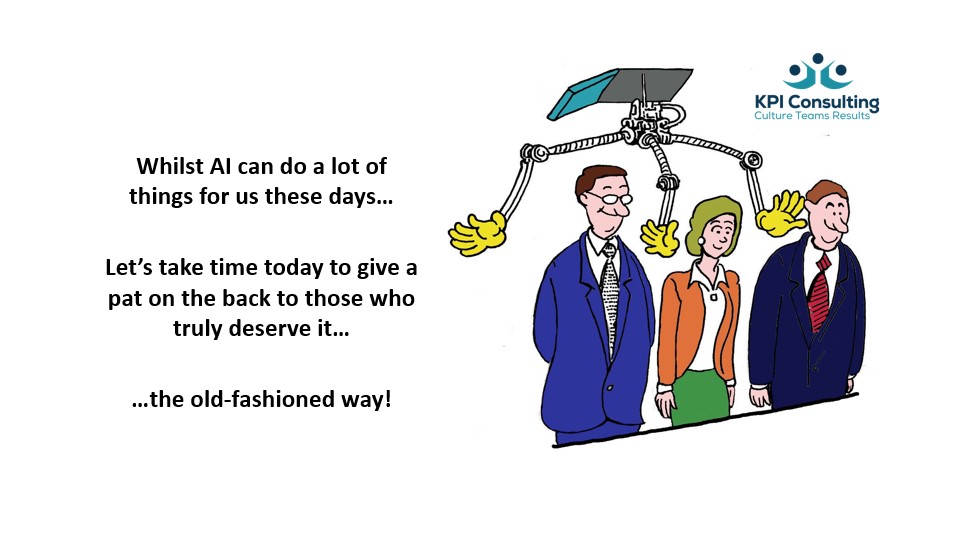 Leadership Lessons from the Contact Centre Frontlines!
Leadership Lessons from the Contact Centre Frontlines!
Fun Friday Feature: Leadership Lessons from the Contact Centre Frontlines!
Today, we're diving into the dynamic world of contact centres - where every call is an opportunity, and every challenge is a lesson in leadership. Here’s why contact centre leaders are unsung heroes in the world of management, and deserve a little bit of kudos for their extraordinary efforts each day:
1. Quick Decision-Making - Ever been on a call with a customer needing immediate answers? Contact centre leaders excel in making swift, effective decisions, a skill every leader should dial up!
2. Empathy in Action - It's one thing to manage; it's another to manage with empathy. These leaders truly listen and respond to both customer and team needs, setting the gold standard for empathetic leadership.
3. Mastering Multitasking ️ - Juggling multiple tasks while keeping a team motivated? That’s just a typical Tuesday for our contact centre leaders. They are the multitasking maestros who keep the show running smoothly.
4. Staying Cool Under Pressure ️ - When the queue lights up, staying cool is key. These leaders keep their composure, proving that the best leaders are also great under pressure.
5. Inspiring Teams - They don’t just manage; they inspire. Leading by example, these champions make every agent feel like the star of a winning team.
So, let’s give it up for the leaders who make sure that every call ends with "How can I assist you further?" rather than "Goodbye"!
Tags: Customer Experience, Leadership, Coaching
 Sometimes we have to wear too many hats. Here's how to manage them
Sometimes we have to wear too many hats. Here's how to manage them
Leaders in contact centres often find themselves juggling multiple roles due to the dynamic and demanding nature of the environment.
In the absence of being able to grow multiple heads, here’s how they manage the challenge of wearing so many different hats each day:
Effective Delegation:
A key strategy for managing multiple responsibilities is effective delegation. Leaders identify the strengths and capabilities of their team members and assign tasks accordingly. This not only ensures that tasks are completed efficiently but also helps in developing employees' skills and confidence.
Prioritization and Time Management:
Leaders need to prioritize tasks based on urgency and importance. This involves distinguishing between what must be done immediately, what should be scheduled for later, and what can be delegated or dropped. Good time management skills are crucial, as they help leaders focus on strategic goals while dealing with day-to-day operations.
Adaptability and Flexibility:
Contact centre environments are prone to sudden changes, such as shifts in customer demand or technical disruptions. Leaders must be adaptable, able to switch between tasks quickly and efficiently, and handle unexpected situations with composure.
Communication Skills:
Effective communication is vital in a leadership role, especially when one has to assume various roles. Clear communication helps in setting expectations, delivering feedback, and ensuring that everyone is aligned with the organisation’s goals.
Continuous Learning and Development:
To effectively manage different areas, leaders must be committed to continuous learning. This could involve keeping up to date with the latest in technology, customer service trends, and management practices. It also includes learning from everyday experiences and feedback.
Leveraging Technology:
Modern contact centres use various technologies that can help leaders manage their roles more efficiently. These might include customer relationship management (CRM) systems, automated reporting tools, and workforce management software. Leaders must be adept at using these tools to streamline operations and gather insights.
Emotional Resilience:
Leading a contact centre can be stressful due to the high-pressure environment. Leaders need to develop emotional resilience to manage their own stress and support their teams effectively.
Building a Supportive Culture:
By fostering a supportive and inclusive culture, leaders can encourage team members to take initiative and support each other. This reduces the burden on the leader and enhances team performance.
Balancing these multiple roles requires a combination of skills, strategies, and a proactive approach. Effective leaders are those who cannot only manage these challenges but also drive their teams towards achieving business goals and providing excellent customer service.
Tags: Customer Experience, Leadership, Management
 5 Top Call Center mistakes
5 Top Call Center mistakes
Top 5 call centre mistakes.
1. Lack of Adaptability:
One of the most significant leadership mistakes in call centres is a failure to adapt to rapidly changing circumstances. Leaders who rigidly adhered to outdated strategies or resisted digital transformation found themselves falling behind.
2. Poor Communication:
Communication breakdowns are a major issue in call centre leadership. Leaders who failed to effectively communicate their vision, expectations, and goals often faced disengaged and confused teams.
3. Neglecting Employee Well-being:
The importance of employee well-being, with burnout is becoming a widespread issue. Leaders who pushed their teams too hard without considering work-life balance or mental health faced increased turnover and decreased productivity.
4. Micromanagement:
Micromanagement continues to be a common leadership mistake. Leaders who don't trust their teams or excessively control every aspect of a project hinder creativity and stifle employee growth.
5. Ignoring Diversity and Inclusion:
Diversity and inclusion continues to be crucial aspects of effective leadership. Leaders who failed to foster diverse and inclusive workplaces face reputational damage and miss out on the benefits of varied perspectives.
What are the mistakes that you see day to day in your call centre? And if you don't work in a call centre, but have experienced being a customer of one, I'd love to know about your experience.
I will be creating a survey in the next couple of weeks, so your input would be most appreciated.
Tags: Customer Experience, Leadership, Management
 Can you teach AI how to have the 'craic'
Can you teach AI how to have the 'craic'
As a response to my article about rapport building in contact centres published in ICMI yesterday, my good friend Ultan Ó Broin questioned the script-driven approach sometimes used, and asked the above question.
Seeing as it’s Friday, why not ask the most appropriate resource available…AI itself – here’s what it had to say. We’ll refer to this AI as ‘Patrick’. As you can see in the picture, Patrick wears the ‘craic’ well, but can he deliver?
Teaching AI to have "the craic" involves instilling a sense of humour and the ability to engage in playful, witty, and enjoyable conversation, much like the spirited social interaction celebrated in Irish culture.
Here are a few strategies that could be employed:
Understanding Cultural Nuances:
AI needs to comprehend cultural references, idioms, and humour specific to the culture where "craic" is valued. This could involve training on datasets that include colloquial language, jokes, and conversational patterns typical in Irish social settings.
Natural Language Understanding:
Enhance the AI's capability to understand and generate natural language. This includes grasping context, irony, and the subtleties of humour. Models like GPT are trained on diverse text inputs that help them understand and generate human-like text.
Emotional Intelligence:
AI should be able to detect and respond appropriately to the emotional tone of a conversation. This includes recognising when to be humorous and when to be serious, adapting to the mood and flow of the dialogue.
Interactive Learning:
Implementing interactive learning scenarios where the AI can engage in real-time conversations with humans and receive feedback on its performance. This could help the AI learn what works and what doesn’t in a casual, fun conversation.
Generative Capabilities:
Enhancing the AI's ability to generate diverse and creative responses. This can be achieved by training on a wide range of conversational data, including witty exchanges, which can teach the AI to be more spontaneous and engaging.
Feedback Loops:
Regularly updating the AI's training based on user interactions and feedback can help refine its conversational abilities and sense of humour, making its "craic" more genuine and enjoyable.
By combining these approaches, an AI can be better equipped to not just understand but actively participate in and contribute to the light-hearted, engaging banter that defines having the craic.
Mine’s a Guinness please Patrick!! Happy Friday everyone - may the road rise up to meet you!!
Tags: AI, Customer Experience, Generative AI
 Building Rapport with your team and customers
Building Rapport with your team and customers
Building rapport with your team and customers.
Building rapport with your team and customers is key to creating lasting relationships. A recent experience reminded me of just how important it is to show genuine interest in others. A few years ago, I met the CEO of a large company and mentioned that I had just gotten married. Fast forward two years later, when we met again, he remembered and asked about my wife by name. This small gesture made a lasting impression on me.
Last week, during a call with a contact centre advisor from one of my utility providers, I mentioned that I had just gotten a new puppy named Asha (in the pic). During a follow-up call this week, a different advisor asked about how Asha was doing by name. This simple act of making note, remembering and showing interest made me feel very valued as a customer.
It's the little things that make a big difference when it comes to customer service and building relationships. By taking the time to remember small details about your team and customers, you can create a personal connection that goes a long way.
Well done...you have my business, and you're also going to be keeping it!
Tags: Customer Experience, Leadership, Customer Loyalty
 Leadership in the Digital Age: Understanding People and Technology
Leadership in the Digital Age: Understanding People and Technology
In today's rapidly evolving digital landscape, the role of a leader transcends beyond traditional management. In my experience, I see leaders are not taking the time to understand the level of IT proficiency within their teams and expect that people know how to efficiently use the likes of simple software such as Outlook and Excel.
To truly excel, leaders must deeply understand not only the technology that drives their business but, more importantly, the people who wield it. Not everyone grows up with a phone in their hand, even in this day and age. I certainly didn't, and my family didn't own a TV until I was 12 years old...and that was black & white (it was great fun watching the snooker).
Understanding Your Team
The first step towards effective leadership is understanding the people you lead. This involves recognising their strengths, motivations, skills and challenges. Leaders who invest time in understanding their team's unique dynamics and individual needs can foster a more inclusive, supportive, and productive work environment. This understanding also helps in tailoring strategies that leverage individual strengths for collective success.
Grasping Technology
Equally crucial is a leader’s grasp of technology. In an age where digital tools can redefine markets overnight, leaders must stay informed about technological trends and innovations. This knowledge isn't just about keeping up with tools and software; it’s about understanding how these advancements can enhance workflows, create new opportunities for growth, and drive competitive advantage. And most importantly, share this knowledge...don't expect others to know something you've only just learnt.
Combining People and Technology
When leaders effectively combine their understanding of both their team and relevant technologies, they create a powerful synergy. This synergy not only accelerates problem-solving and innovation but also enhances employee engagement and retention. Employees feel valued when they see their leaders taking an active interest in the tools and techniques that shape their daily work experiences.
Call to Action
As we navigate the complexities of the 21st century, the leaders who will stand out are those who commit to continuously learning about both their people and the technologies that impact their industries. Whether you’re leading a small team or a large corporation, the dual focus on people and technology is the cornerstone of visionary leadership.
Tags: Coaching, Leadership, Management
 Effective Communication Tips
Effective Communication Tips
Effective communication is crucial for leadership as it directly influences the ability to lead successfully.
As a leader, communication skills enable you to articulate vision, set clear expectations, and guide your team towards achieving goals. It fosters trust and transparency, encourages engagement, and enhances collaboration among team members. Good communication also aids in managing conflicts, inspiring and motivating employees, and facilitating innovation by encouraging the exchange of ideas.
Ultimately, a leader's communication ability can determine the efficiency, cohesion, and overall success of their team.
In my experience, three core principles have consistently stood out as foundations for effective communication:
Clarity and Conciseness:
Whether it's setting goals, providing feedback, or discussing strategies, being clear and concise prevents misunderstandings and keeps the team focused.
And please don't be afraid to tell someone that they're doing something wrong - although some of you may find it a little scary to have these conversations, and these conversations can sometimes be deemed as 'difficult', but that's only in your eyes. Imagine being the person who is doing something wrong, isn't aware of it (everyone else is), but their manager is too worried about having a 'difficult' conversation. How unfair is that? Be brave, face your fears, and be professional and constructive when doing so. The alternative will be a lot more difficult later on.
Active Listening:
Communication is a two-way street. Active listening ensures that we understand the concerns and ideas of our team members, fostering a more collaborative environment.
Active listening requires the listener to fully concentrate, understand, respond, and then remember what is being said. It's more than just hearing the speaker; it involves a conscious effort to hear not only the words that another person is saying but, more importantly, the complete message being communicated.
Please give the team your time, and most importantly, your concentration, understanding and respect.
Consistent Feedback:
Regular and constructive feedback helps build trust and continuous improvement. It encourages an open dialogue and shows that we value our team’s contributions and growth. It is your responsibility as a leader to ensure your team receive this feedback, because how else would we learn?
In the future when people ask about you, ensure the response is "I learnt so much from that person", and not, "Who?"
Implementing these principles doesn't just enhance productivity; it builds a stronger, more cohesive team. I’ve seen projects turn around and team morale boost, all because we improved how we communicate.
Tags: Coaching, Leadership, Management
 Leadership Insights from the World of Stand-Up Comedy
Leadership Insights from the World of Stand-Up Comedy
In an unexpected twist, it turns out that the art of stand-up comedy offers profound lessons for leaders in any field. As someone who has experienced both the exhilaration and the challenges of leadership over the past 25 years, and my experiences in the Irish Comedy scene for the past 20 years, I've discovered that the principles guiding successful comedians can significantly enhance our leadership skills, particularly in the realms of self-awareness and vulnerability.
Self-Awareness: The Core of Your Material
Just as comedians delve deep into their experiences to find relatable, authentic material, leaders must engage in self-reflection to understand their strengths and weaknesses. This journey of self-awareness isn't just about capitalizing on what you're good at; it's about recognising where you falter and how those aspects can impact your team. A comedian's acute self-awareness allows them to connect with diverse audiences. Similarly, a leader's insight into their own character can bridge gaps, inspire trust, and foster a strong team dynamic.
Vulnerability: The Strength in Letting Go
If there's one thing stand-up comedy teaches you, it's that vulnerability can be a powerful tool. Comedians share their failures, fears, and faux pas, turning their vulnerabilities into a source of connection and laughter. In leadership, showing vulnerability isn't a sign of weakness; it's an invitation for others to see the human behind the role. It builds empathy and shows your team that it's okay to take risks, make mistakes, and be open about challenges.
The Feedback Loop: Laugh, Learn, Iterate
Every stand-up performance is an opportunity for feedback. Comedians listen to their audience's reactions - every laugh, silence, or groan - to refine their act. Effective leaders, too, must embrace feedback with an open heart and an eagerness to improve. It's about creating a culture where feedback is welcomed and acted upon, where every challenge is seen as a chance to grow.
Timing and Adaptability
Comedy is all about timing, and so is leadership. Knowing when to push forward with an initiative or when to take a step back is crucial. Similarly, being adaptable - able to pivot your approach based on the team's mood or the project's needs - mirrors a comedian's ability to change their set based on the room's energy.
Conclusion:
The stage of stand-up comedy, much like the arena of leadership, is not for the faint of heart. It requires courage, self-awareness, and the willingness to be vulnerable. As leaders, if we can embrace these lessons, we can create environments where creativity flourishes, challenges are embraced, and teams feel genuinely connected and supported.
Let's take a cue from the world of comedy: be real, be you, and remember, the power of leadership, much like comedy, lies in connecting with people on a human level.
Tags: Coaching, Leadership, Management
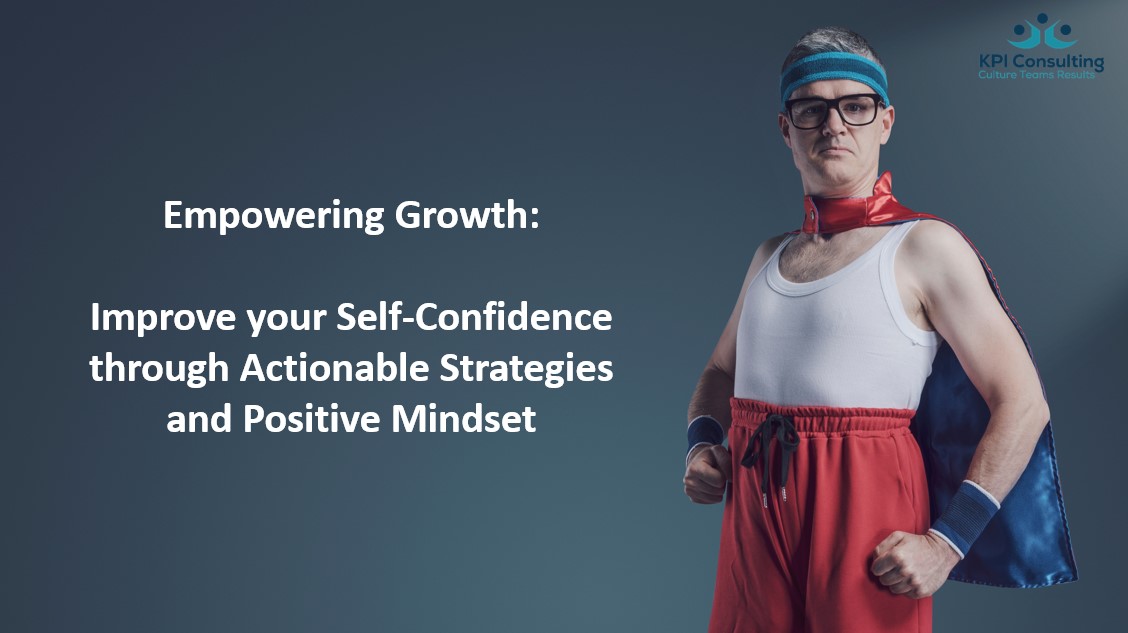 Empowering Growth - Improve your Self-Confidence through Actionable Strategies and Positive Mindset
Empowering Growth - Improve your Self-Confidence through Actionable Strategies and Positive Mindset
Although it may be be difficult, leadership is about confidence, and most importantly your own self-confidence. I have also suffered from this in my career, and I have always taken steps to improve myself, although every day is a 'school' day as they say, and so it should be.
Improving your confidence is a personal journey that can involve a variety of strategies. Here are some tips that have helped me along the way:
Set Small Goals: Start with small, achievable goals that you can accomplish. Successfully achieving these goals can boost your confidence and motivate you to tackle bigger challenges.
Practice Self-Compassion: Be kind to yourself. Acknowledge your efforts, progress, and accomplishments. Remind yourself that everyone makes mistakes and that they are opportunities for learning and growth.
Prepare and Practice: Whether it's public speaking, a job interview, or any other skill, preparation and practice can significantly boost your confidence. Familiarity with the subject matter or task at hand can make you feel more secure and less anxious.
Positive Affirmations: Use positive affirmations to challenge and overcome self-doubt. Repeating positive statements about yourself can help change negative thought patterns into more positive ones.
Visualize Success: Visualization is a powerful tool. Imagine yourself succeeding in your endeavours. This mental practice can enhance your confidence and reduce anxiety about future tasks or performances.
Build Skills: Identify areas where you feel less confident and take steps to improve your skills in those areas. Whether through formal education, online courses, or self-study, enhancing your abilities can boost your self-confidence.
Surround Yourself with Support: Spend time with people who uplift you and believe in your abilities. A supportive network can encourage you when you're feeling doubtful and celebrate your successes with you. Find a mentor!
Stay Healthy: Physical well-being can influence your mental state. Regular exercise, a healthy diet, and adequate sleep can improve your overall mood and energy levels, contributing to a more positive self-image.
Face Your Fears: Stepping out of your comfort zone and facing your fears can be empowering. Start with small steps and gradually expose yourself to situations that scare you, building your resilience and confidence over time. My journey took me to the stand-up comedy stage...yours doesn't have to.
Seek Professional Help: If your lack of confidence is affecting your daily life or mental health, consider seeking help from a counsellor or therapist. Professional guidance can provide you with strategies to build your self-esteem and address underlying issues.
Remember, building confidence is a process that takes time and patience. Celebrate your progress, no matter how small, and be persistent in your efforts.
The picture is from a stock image - I didn't have the confidence to post the one I took of me in a similar outfit - maybe someday
Tags: Leadership, Management, Mental Health
 Tips for improving employee morale this Easter
Tips for improving employee morale this Easter
Trust me, you don't want to miss this Easter tip! While it's common to gift Easter eggs to your team, why not take it up a notch this year? Buy a few extra eggs, store them away and run an incentive towards the end of April with the surprise prize being those eggs you've saved!
It may sound silly, but here's the impact:
1. Your team will recognize you as a future-focused leader.
2. It will create excitement - everyone loves an Easter egg, especially when you can't buy them anywhere else.
3. Imagine the look on your employee's kids' faces when they receive an Easter egg at the end of April - it's priceless.
4. And yes, you can buy this feeling, but it'll only cost you around €5 per egg.
Happy Easter everyone! Hope you find this tip useful. You'll thank me in a month's time, if you haven't eaten them all yourself before then.
Tags: Culture, Leadership, Management
 Leadership Lessons from Harry Potter
Leadership Lessons from Harry Potter
Warning: The image you're about to view has extreme levels of cuteness that may cause uncontrollable smiling, 'awwing,' and an irresistible urge to hug your screen. Viewer discretion is advised, especially for those susceptible to acute bouts of happiness and joy.
On a serious note, when sending this young man off to school yesterday dressed as Harry Potter, I thought about the young leaders in our businesses today who would have grown up watching Harry and his friends, and I wondered what leadership lessons Harry would have taught them over the years. His journey, from a young boy who learns of his magical heritage to the hero who plays a crucial role in the defeat of the dark wizard Voldemort, embodies qualities and lessons that are valuable for leadership. here are some of his attributes.
Courage in the Face of Adversity:
Harry's willingness to face dangerous situations, even when the odds are against him, showcases the importance of courage in leadership.
Humility and the Willingness to Learn:
Despite his fame within the wizarding world, Harry remains humble and open to learning from others.
Importance of Teamwork and Collaboration:
Throughout the series, Harry relies on his friends and allies to overcome obstacles. This highlights the significance of building a strong team and fostering collaboration.
Resilience and Perseverance:
Harry's ability to persevere through personal losses and setbacks without losing hope is a powerful lesson in resilience.
Ethical Leadership and Integrity:
Harry's decisions are often guided by his moral compass, demonstrating the importance of ethics and integrity in leadership.
Empathy and Compassion:
Harry's ability to understand and feel for others, even his enemies, showcases the power of empathy and compassion in leadership.
Innovation and Creative Problem-Solving:
Harry often finds himself in situations that require quick thinking and innovative solutions. This ability to adapt and think creatively is crucial for leaders facing complex challenges in a rapidly changing world.
Harry Potter's journey offers valuable insights into courage, humility, teamwork, resilience, ethical leadership, empathy, and innovation. These qualities are essential for effective leadership and can inspire leaders to reflect on their own practices and how they can lead more effectively.
Not sure if my boy understands all of this just yet, but he certainly figured out how to crack his Daddy over the head with that wand immediately after I took the photo.
Tags: Management, Leadership, Education
 'FREEFALL' Leadership Program
'FREEFALL' Leadership Program
Location: In person or virtual Fees: 2,000
Service Type: Service Offered
 Public Speaking for Leaders from the Stand-Up Comedy Stage
Public Speaking for Leaders from the Stand-Up Comedy Stage
Location: In person or virtual Fees: 2,000
Service Type: Service Offered
 Transforming Citizen Experience: Edinburgh Council’s Story
Transforming Citizen Experience: Edinburgh Council’s Story
Location: virtual Date : April 30, 2025 - April 30, 2025 Organizer: Dara Kiernan
 Chapter 23: Breaking Orbit
Chapter 23: Breaking Orbit Watching the Reaction - What Trump’s Disappointment Can Teach Us About Leadership
Watching the Reaction - What Trump’s Disappointment Can Teach Us About Leadership Ryder Cup Lessons: Resilience in the Face of Noise
Ryder Cup Lessons: Resilience in the Face of Noise